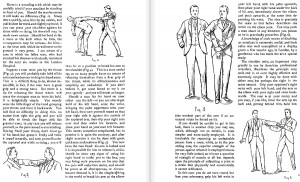- Originally published on the Bartitsu.org site on Friday, 23rd April 2010
A longtime wrestling, boxing and general “antagonistics” enthusiast, Percy Longhurst’s precise connection with Bartitsu is a matter of some speculation.
He was among the audience at some of E.W Barton-Wright’s early self defence exhibitions in London (1898-99) and actually volunteered to try his considerable wrestling skill against one of the newly-arrived Japanese jiujitsuka; by his own account, Longhurst put up a game defence but was quickly defeated, apparently with some sort of arm-lock. Circumstantial evidence suggests that he was likely among the original members of Barton-Wright’s Bartitsu Club, as he later credited a particular throwing technique to Barton-Wright; he was definitely a student of Yukio Tani’s and Sadakazu Uyenishi’s, but the chronology is not clear.
Longhurst was a prolific writer on all manner of athletic topics. His commentaries on, for example, the disadvantage of European wrestlers being required to fight under Barton-Wright’s submission grappling rules during the latter’s music hall challenge performances, and his balanced and realistic take on the “boxing vs. jiujitsu” controversy of 1906-7, reveal a canny and pragmatic approach to personal combat. Longhurst’s book “Jiu-Jitsu and Other Methods of Self Defence“, likewise, offered a very Bartitsu-like combination of wrestling, jiujitsu, boxing, kicking and stick fighting techniques, and is, in fact, the closest thing to a “Bartitsu manual” to have come out of England in the early 20th century.
Longhurst’s article “A Few Practical Hints on Self Defence” (reproduced below) was originally published in Sandow’s Magazine of Physical Culture between January and June of 1900. It presages “Jiujitsu and Other Methods of Self Defence” in several ways and is also notable for including a veiled reference to the Afro-Brazilian martial art of capoeira (!)
Click on the images below to see them in full size.
Along with his colleagues William Garrud, W. Bruce Sutherland and Percy Bickerdike, Longhurst later became a founding member of the British Jiujitsu Society, and he continued to write on judo, jiujitsu and self defence topics throughout the early-mid 20th century.




